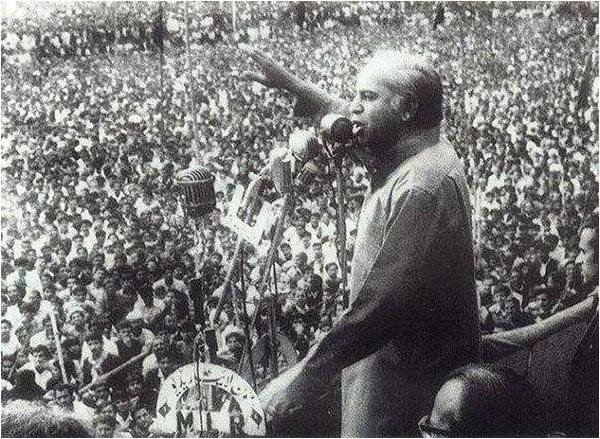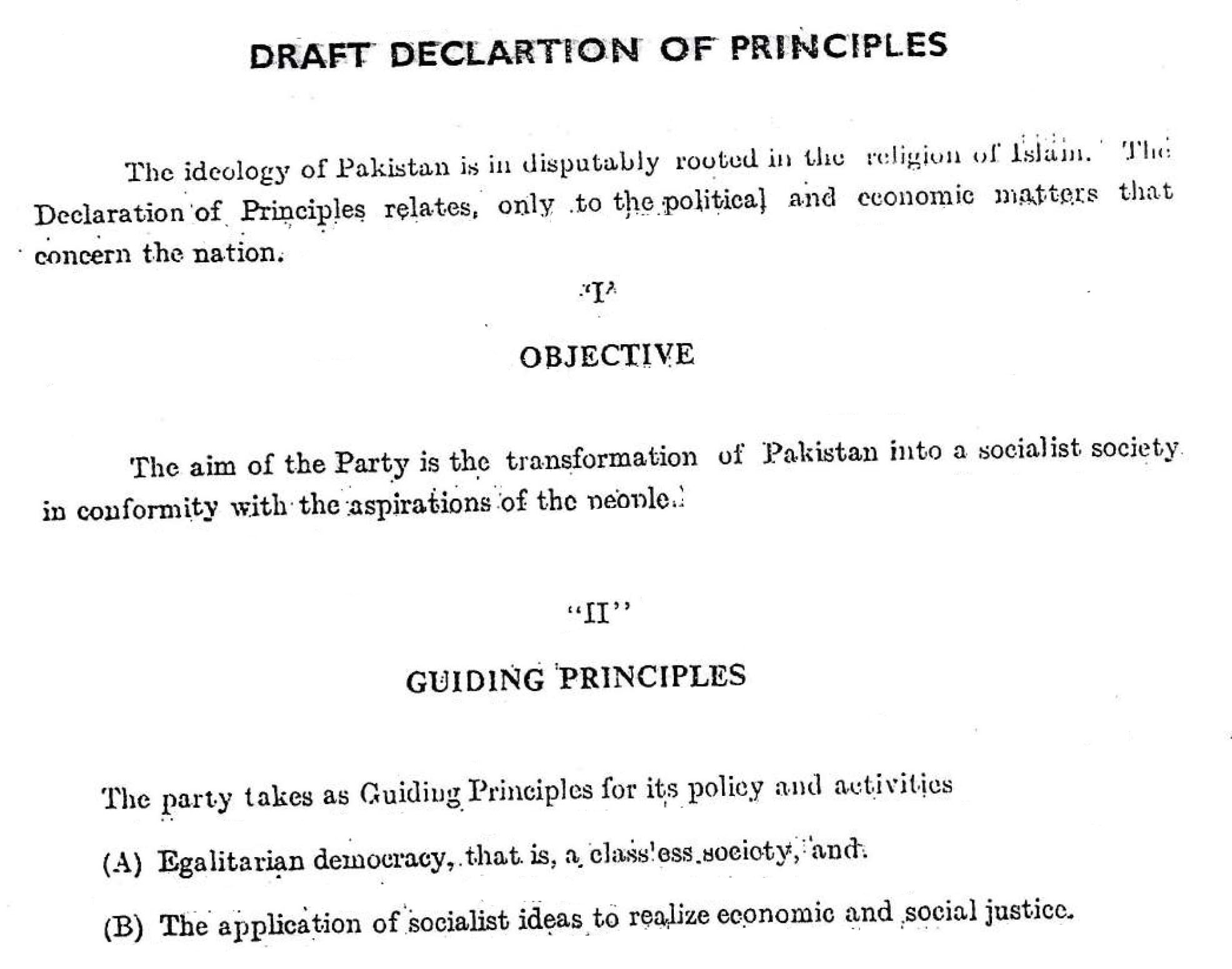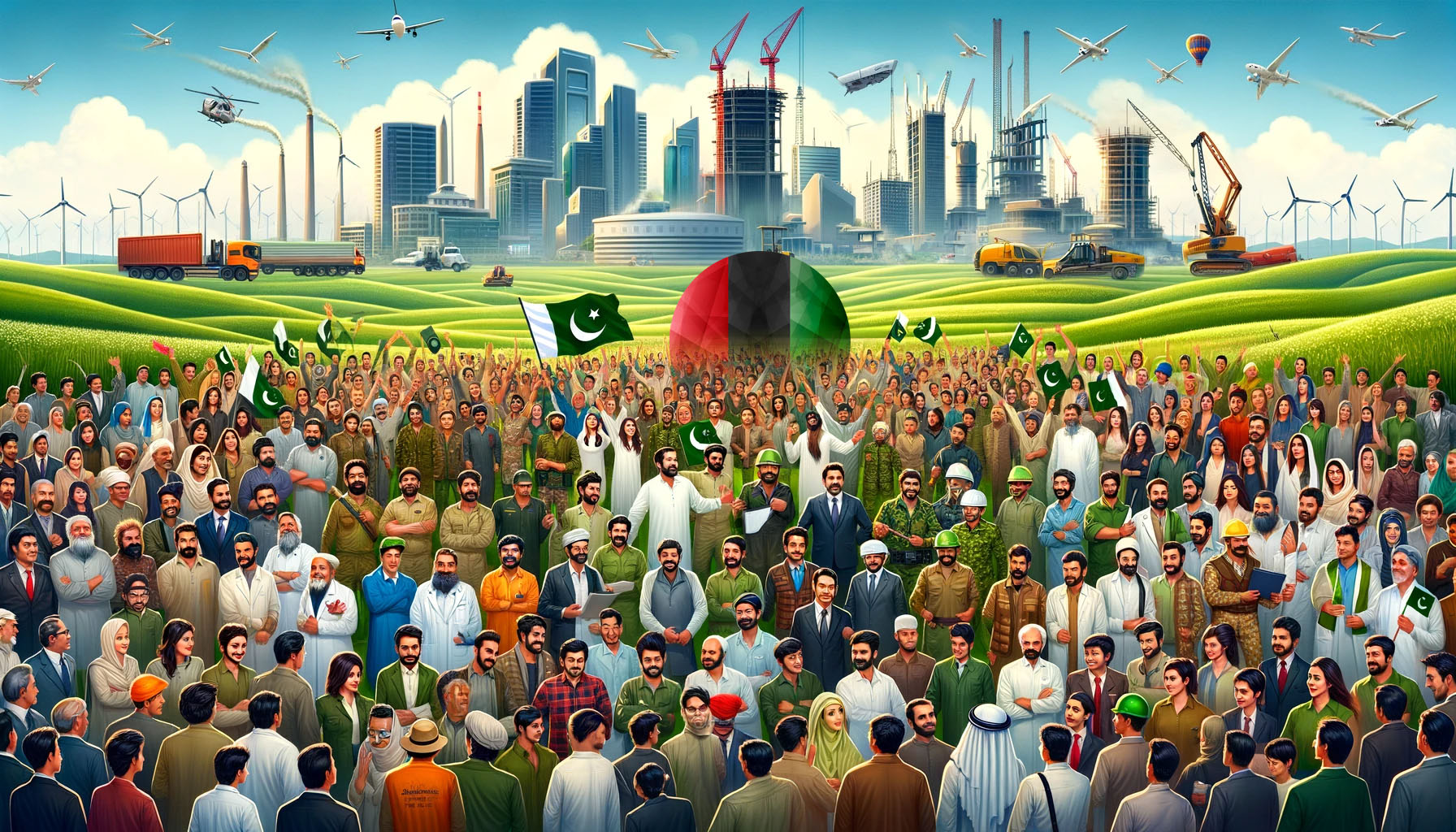November 30, 2023, has marked the 56th foundation day of the Pakistan Peoples Party (PPP), a monumental occasion to reflect on a political journey that has significantly shaped Pakistan’s socio-political landscape. Founded in 1967 by Zulfikar Ali Bhutto, the PPP emerged as a beacon of hope for many, advocating socialism, nationalism, democracy, progressivism and a stand against feudalism.
Historical Context
In 1958, General Ayub Khan led a military coup, marking the beginning of military rule in Pakistan. This era was characterized by political suppression and a lack of democratic freedom, leading to widespread dissatisfaction among the populace.
The government’s "One-Unit" policy, which sought to merge the four provinces of West Pakistan into a single unit, was deeply unpopular, especially in smaller provinces. It was seen as a move to centralize power and reduce political representation. There was a significant disparity between the economic development of East and West Pakistan. Despite East Pakistan (now Bangladesh) contributing a major portion of the country's GDP, notably through its jute industry, it received far less investment and attention from the central government.
The political structure at the time was highly centralized, with limited provincial autonomy. This led to feelings of political exclusion, particularly in East Pakistan, which later fueled separatist sentiments.
 Zulfikar Ali Bhutto, who was initially part of Ayub Khan’s cabinet, eventually became one of his staunchest critics. His disagreements with the government centered around several key issues.
Zulfikar Ali Bhutto, who was initially part of Ayub Khan’s cabinet, eventually became one of his staunchest critics. His disagreements with the government centered around several key issues.
Bhutto strongly opposed the Tashkent Agreement of 1966, which sought to resolve the Indo-Pakistani War of 1965. He viewed the agreement, particularly the clause of returning conquered territory, as a capitulation to India and a betrayal of Pakistan's interests. Bhutto was critical of Ayub Khan's autocratic style of governance. He believed in a more democratic and populist approach, where the voices of the masses, particularly the less privileged, were heard and addressed. ZAB was also critical of the government's economic policies, which he felt favoured the elite and ignored the plight of the common people. He advocated for socialist-oriented economic reforms and greater social equity. Bhutto was aware of the growing discontent in East Pakistan and recognized the need for a more equitable distribution of power and resources between the two wings of Pakistan.
Formation of PPP
In the politically tumultuous era of the 1960s when Pakistan was grappling with deep-seated economic and social disparities, Zulfikar Ali Bhutto sensed the need for a political revolution. Driven by his vision for a more equitable and democratic Pakistan, Zulfikar Ali Bhutto founded the PPP on the ethos of empowering the common man.
 The foundation of the Pakistan Peoples Party (PPP) in 1967 was a pivotal event in Pakistan's political history, marked by a founding convention held on November 30th and December 1st, 1967, at Dr. Mubasher Hussain's residence in Gulberg, Lahore. The main objective set forth during the founding convention was to bring about a socialist change in Pakistani society. The PPP aimed to create a classless society, which was seen as achievable only through the adoption of democratic socialism. This goal was reflective of the party's commitment to addressing the prevalent socio-economic disparities in Pakistan at the time. The party’s founding principles were based on social justice, economic equity, and the empowerment of the underprivileged, contrasting sharply with the policies of the then government.
The foundation of the Pakistan Peoples Party (PPP) in 1967 was a pivotal event in Pakistan's political history, marked by a founding convention held on November 30th and December 1st, 1967, at Dr. Mubasher Hussain's residence in Gulberg, Lahore. The main objective set forth during the founding convention was to bring about a socialist change in Pakistani society. The PPP aimed to create a classless society, which was seen as achievable only through the adoption of democratic socialism. This goal was reflective of the party's commitment to addressing the prevalent socio-economic disparities in Pakistan at the time. The party’s founding principles were based on social justice, economic equity, and the empowerment of the underprivileged, contrasting sharply with the policies of the then government.
The primary manuscript of the PPP was compiled by Shaheed Zulfiqar Ali Bhutto, J.A. Rahim, and Dr. Mubasher Hussain. This document, finalized after a lengthy discussion, laid the ideological foundation for the party. The participants were keenly aware that they were embarking on a journey to fundamentally reshape the lives of Pakistan's people, leading to the formation of a party rooted in socialist ideals.
The reaction of the people towards the newly founded Pakistan Peoples Party (PPP) in 1967 was marked by a mix of enthusiasm, hope, and skepticism, reflecting the diverse political and social landscape of Pakistan at the time.
PPP's populist ideology, focusing on the needs and rights of the common man, resonated deeply with a significant segment of the population. This was particularly true among the lower and middle classes, who felt marginalized by the existing political system. The party’s stance against feudalism and for socialist policies appealed to peasants and workers. Bhutto's promise of land reforms and better labour rights garnered significant support from these groups. The PPP also attracted the youth and students of the country, who were eager for political change and social justice. Bhutto's charismatic leadership and his ability to connect with the younger generation played a key role in this. The upper class and the feudal lords, however, were skeptical, if not outright opposed to the PPP, due to its anti-feudal and socialist leanings, which threatened their interests and status.
In the context of the prevailing political suppression and military rule, the founding of PPP was seen as a breath of fresh air, offering a new political vision. For many, the PPP symbolized a hope for the return to democracy and a shift from autocratic rule to a more inclusive and representative political system.
Core Ideology and Principles
The PPP's ideology is a tapestry of democratic socialism, aiming for equitable social development alongside economic progress. A notable aspect of its doctrine is anti-feudalism, reflecting Bhutto’s vision of breaking down age-old feudal structures to redistribute power and resources more equitably.
Democratic Socialism
The PPP advocates for democratic socialism, which aims to balance social equity with economic development. This ideology is distinct from pure socialism as it operates within the framework of a democratic political system.
A key tenet is the focus on social welfare and the equitable distribution of wealth. The PPP has historically emphasized policies aimed at reducing poverty and improving the living standards of the underprivileged.
People-Centric & Anti-Feudalism
People-centric policies have been a hallmark of the PPP. The party has consistently positioned itself as a voice of the common people, particularly those marginalized by the existing socio-economic structures. The PPP's policies often focus on empowering the poor and addressing the needs of the working class.
Bhutto's vision was strongly against feudalism. The party sought to implement land reforms to break up large feudal estates, which were seen as a barrier to social and economic progress. The aim of land reforms was to redistribute land to peasants and empower agricultural workers, thereby reducing the power of feudal lords.
Nationalism and Sovereignty
The PPP has consistently emphasized the importance of protecting Pakistan's sovereignty and national interests. This is evident in its stance on various international issues and relations with other countries. The party has also been vocal about maintaining the unity and territorial integrity of Pakistan, advocating for policies that strengthen national cohesion.
Progressive and Inclusive Policies
The PPP has historically advocated for progressive social policies, including rights for women and minorities. The party emphasizes the importance of education and healthcare, advocating for policies that make these basic services accessible to all citizens.
Commitment to Democracy
Despite periods of turmoil and challenges, the PPP has remained committed to the principles of democratic governance and the rule of law. The party has been a proponent of civil liberties and human rights, standing against military rule and authoritarianism in Pakistan.
Journey Towards Prosperity
As the Pakistan Peoples Party (PPP) commemorates 56 years since its foundation, it stands as a testament to its enduring commitment to socialism, democracy, and progressivism. From the groundbreaking tenure of Zulfikar Ali Bhutto to its current governance, PPP's journey is marked by significant contributions that have shaped Pakistan's socio-political and economic landscapes.
Under ZAB's leadership, the formulation of the 1973 Constitution was a monumental stride towards embedding democratic values and the rule of law in the national ethos. Land reforms, the introduction of national identity cards, and the nationalization of key industries, free housing for poor underscored PPP's commitment to social equity and empowerment. The party's focus on establishing mutually respectful foreign relations and initiating Pakistan's nuclear program demonstrated its dedication to national security and progress.
In recent years, particularly in Sindh, PPP has continued its mission, advancing healthcare, education, and infrastructure. The establishment of state-of-the-art medical facilities, emphasis on educational accessibility and modernization, and investments in renewable energy projects highlight its focus on sustainable development and societal welfare.
PPP's consistent efforts in women's empowerment, environmental initiatives, and economic reforms reflect its adaptability and commitment to progressive ideals. The party's trajectory shows a persistent pursuit of policies and initiatives that resonate with its core ideologies, significantly impacting the lives of Pakistani citizens and the nation's trajectory.
PPP - A Beacon of Hope
As we look back on the 56-year odyssey of the Pakistan Peoples Party (PPP), it's evident that the party remains a beacon of hope for a prosperous, progressive, democratic, and inclusive Pakistan. In the hearts of millions, PPP resonates not just as a political entity but as a symbol of the relentless pursuit of social justice, equality, and the empowerment of the marginalized. The party’s unwavering commitment to uplifting the downtrodden, its fervent advocacy for women's rights, and its relentless push towards educational and healthcare reforms, all while navigating the turbulent waters of Pakistan's political landscape, have solidified its status as more than a party – it’s a movement, a promise of a brighter future. Today, as it continues to champion the ideals of democracy and inclusivity, the PPP stands tall, not just as a testament to its illustrious past, but as a guiding star, leading Pakistan towards a horizon filled with hope, unity, and prosperity.


